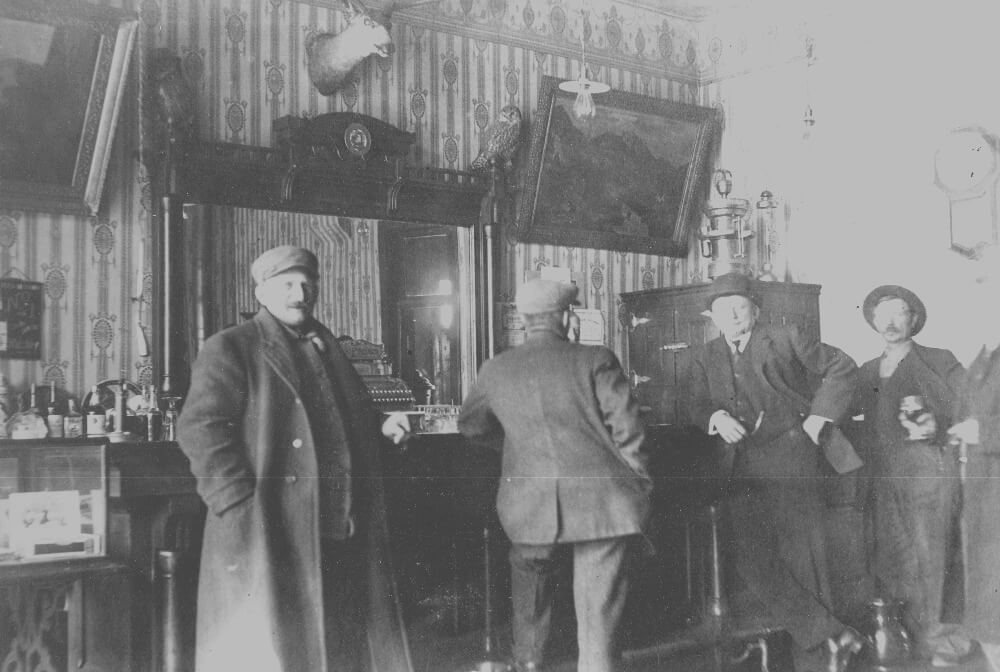An important element in the history of Custer County is the brick structure on Westcliffe’s Main Street that houses the Jones Theater today. It originally was a rootin’, tootin’ saloon and pool hall in the 1880s, where town rowdies could hang out and spend the money they got from mining silver in nearby Silver Cliff and Rosita.
Colorado was experiencing a great silver and gold mining boom, and Westcliffe, with it’s famous Geyser, Bassick, and Bull Domingo mines (which can still be seen and visited today) attracted thousands of young men hoping to find their fortunes. The saloon’s builder, a man named Casper Klutz, chose to put the structure in the part of town then known as “Dutch Row.”

This area to the North of Second Street got its nickname from the numerous stores, saloons, and homes owned by settlers, who originally came from Germany. Many of those buildings did not survive the disastrous fires that periodically swept through the crowded mining town. Casper Klutz’ saloon, however, managed to escape the fiery fate of its neighbors. Thus began over 130 years of history from the early 1880s to the present.
In the 1920s a Westcliffe man by the name of June Canda purchased the “Klutz” building and began showing movies here. June, at the time, also owned a grocery store and cold storage enterprise across the street from the theater. That large structure, today known as “Grandma’s House,” hosted wedding receptions, dances, and roller skating parties in its spacious upstairs hall. Also, Harry Falkenburg, another entrepreneur, began showing silent movies accompanied on the piano by Cap Purdy. They had a good thing going for several years until, during the windy season, the roof blew off the Canda building. Harry, his projector, and Cap’s piano moved across the street into the Canda Theater, and the tradition of showing silent movies and later “talkies” to the folks of Westcliffe continued for many years to come.
In 1938 a “Peerless” carbon-arc movie projector was purchased. This antique remained in service until 2014 when it was replaced with a modern digital projector. In January 1941 the theater was closed for remodeling. New seats were installed for the comfort of its patrons and the lobby was completely redecorated. The grand reopening debuted “The Return of Frank James” starring Henry Fonda. Later, in October of ’41, “The March of Time” series was added to the screen entertainment and was described as “The true Pictorialization of current World Events.” When a movie house in Colorado Springs remodeled its interior, June Canda, ever the entrepreneur, obtained 200 horse hair seats and moved them into his theater.
Canda continued to run the movie house until his death in 1963 at which time his wife Catherine Suzanne took over the business. One year later, in 1964, a heavy snowfall collapsed the roof on a portion of the structure, forcing her to close and sell the theater to the Jones family.
Lawrence and Louise Jones were ranching a herd of 255 steers and looking for a way to make some extra money. Running a movie house seemed like the right ticket so in 1964 they purchased the Canda Theater, changed the name to “Jones Theater,” and showed films for the next 7 years, when they in turn sold the building to Iris and Dick Wilson who ran the business for 9 years.
In 1980 Dentist Lee Schambach bought the building and added an office and apartment to the rear of the existing facility. Fixing teeth and showing movies kept Schambach busy for 12 years but in 1992 he got out of both occupations and sold the Jones Theater to the present owner, the Relph Family Trust.

The Westcliffe Center for the Performing Arts was formed in 1992 as a not-for-profit corporation to maintain the theater both as a movie house and for live productions. Thanks to generous foundation grants and the efforts of many volunteers the theater has been restored and refurbished to its original 30s glamour. A major addition, “Studio 2” was built in 2003. Attached to the original Jones, Studio 2 provided space for sets and costumes, a Youth Theater for rehearsals and exhibits, a home for KLZR radio, and living quarters for summer interns. New comfortable seats were added to the theater in 2005 and the old carbon arcs were replaced by xenon lights in the antique projectors The first outdoor production was presented in 2007 using an outdoor stage and park-like seating area generously provided by the owner of the adjacent Westcliffe Feed Store property. The play was Shakespeare’s The Tempest and scored a big hit with the audience.
We present eight live productions each summer as well as a full season of first-run movies in our theater, which has 184 seats. The local high school presents several productions during the year. The theater is also used for many concerts ranging from bluegrass to opera. The WCPA looks forward to the continued success and enhancement of this ambitious Community Theater.
